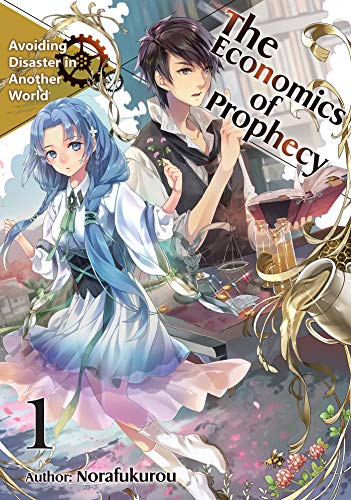By Norafukurou and Rei Shichiwa. Released in Japan by Legend Novels (Kodansha). Released in North America by J-Novel Club. Translated by Hikoki.
So you want to read an isekai, but instead of being a horny Japanese teenager, you’re a late 30s-early 40s Japanese officer worker. You’re married, have a couple of kids. You really are not looking for a fantasy involving game systems, harem building, and fanservice. You don’t even need illustrations. You’re looking for something a bit more highbrow. Fortunately, Legend Novels, a fairly new Kodansha imprint, has you covered. The Economics of Prophecy is not kidding about its economics, and so will replace discussion of gaming stats with correlation coefficients. There is more than one girl interested in the hero, but they are more understated and political about it. As for the hero, well, yes, he’s a bit bland, but he’s bland in an ADULT way. All that said, this is still a young Japanese man transported to another world with monsters and magic, who goes to an elite private school along with his unlucky childhood friend and the gorgeous, naive princess. Not ALL the tropes are gone.
The actual “reincarnated and growing up in a new world” part of Ricardo’s life is glossed over in about two paragraphs – we jump right into him as a young businessman, trying to attend school and get his family honey-making business off the ground. Unfortunately, rival companies are bigger and richer than he is. All he has is his knowledge from Japan of economic theory and his secretary/childhood friend Mia. The fourth princess of the realm, Alfina, even does a taste test between the companies. Unfortunately, as Ricardo finds, once you start meeting this princess you can’t stop meeting her. And she’s actually an oracle with a different prediction than the usual “everything’s fine again this year” – there will be a disaster. What kind? She doesn’t know. Exactly where? She’s not quite sure. Can Ricardo help her figure out what and where is going to happen? And will it even matter given the complacency of this kingdom?
The plot and the main leads are the strongest part of this book. There is a lot of economic stuff, but it never quite gets to the point where you want to flip ahead. Ricardo is one of those “I am scheming and clever but also secretly really nice to people” sorts, a bit like the Genius Prince in Yen’s recent series – he works best when he’s being pressured. Alfina manages to be a very naive, innocent royal without becoming annoying, and she’s really sweet. On the flip side, Mia is vastly underused – we clearly see she has a thing for Ricardo, but given that she (like he) is also emotionally minimal this mostly comes out as disapproval when he’s around other women. I would have liked more of their childhood backstory. Alfina also has an aide that ends up getting relatively humiliated, but I’m not entirely sure that the crime merited the punishment – it wasn’t clear enough that Claudia had abandoned Alfina, so it seemed sort of mean instead.
This is still definitely strong enough that I’d recommend it, and I’ll be reading the second volume. It’s respectable, an isekai you could happily introduce to your parents.
